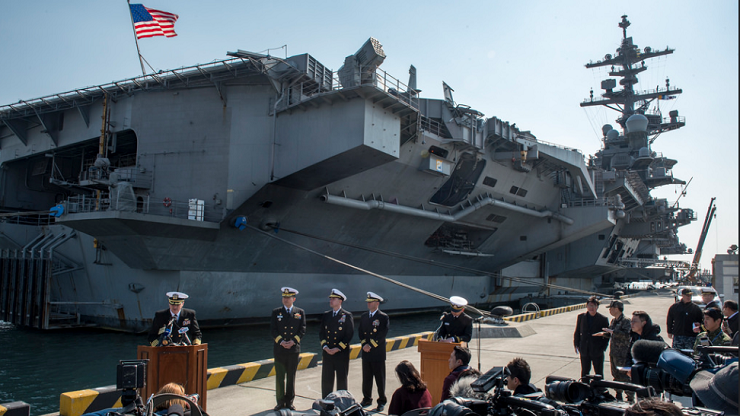An outstanding event took place recently in the conflict around the South China Sea. The US aircraft carrier Carl Vinson moored in the Vietnamese port Cam Ranh. The Americans obviously took a triumph lap in this event – once again after the sadly remembered Vietnamese War and flight from Cam Ranh, where the American aircraft carriers were based at that time, they solemnly returned. Thus, the USA demonstrated both coherence and achievements of their policy in returning the American military forces to South-East Asia, which was declared in 2011.
The question is why the former American and then Soviet naval and air forces base once again solemnly accepted the American aircraft carrier? This fact seemed to be impossible, as the communists that won in Vietnam in 1975 excluded any opportunity of the American return. In addition, the consequences of the barbaric bombing with poisonous substances of Vietnamese fields and forests, thousands of victims among Vietnamese civilians killed by the American soldiers, would predetermine the relations between the two countries for a long time. However, it turned that it is not the case, once again demonstrating how unpredictable the modern foreign policy can be.
The case is that the problem of the ownership of the isles in the South China Sea, where Vietnam and China are disputing over the insular territories, has become one of the most important ones for Vietnam, and solution of which is not evident yet. China’s position has remained practically unchanged for several decades: it declared almost 80% of the water area of the South China Sea as its territory without any agreement with its neighbours stating that all the islands of the sea – the Paracel and Spratly Islands – should also belong to Beijing. Such an approach has resulted into the fact that the conflict in the South China Sea turned into the region’s “sore spot”. Washington decided to use this situation for its benefit.
The power balance around Vietnam is very fortunate for the Americans: the country is in a complex situation, in fact. Russia’s rapprochement with China and the joint manoeuvres of the two fleets in the South China Sea leave no illusions for Hanoi in respect of Moscow’s position in the case of the hot stage of the conflicts in the South China Sea. Washington, through the statements of all its high-ranking visitors in Hanoi starting from President Obama, shows in every possible way its determination and desire to support Vietnam in the event of a military aggravation in the conflict around the islands and marine areas.
It is absolutely clear that all these promises of the USA are no more than a stroke of policy aimed at drawing Vietnam to their side and turning this country into ally in confrontation with China. In addition to the implementation of the so-called hedge policy – that is to form allies among the Southeast Asian nations bordering China that could be managed in a complex system of the US-Chinese relations, the goal of the Americans, especially in Vietnam, was to prove to all – we returned to Vietnam, and returned as the victors. In this regard, we should note that the entire American policy in respect of Vietnam pursues not only pragmatic goals, but propagandistic ones to show that the USA lose the battle, but win the war. In addition, some Americans state that their flight from Vietnam in 1975 was a temporary event, while their return will be permanent.
Meanwhile, It is absolutely obvious that the arrival of Carl Vinson in Cam Ran does not strengthen the security of Vietnam even slightly. There is no doubt that the Americans will act for their own benefit while using their presence in the country to make terms with China, and the situation of January 1974 may occur again. At that time, the Chinese marines landed on the Paracel Islands, where the South Vietnamese troops allied to the Americans have been located. The Americans did not answer to all the appeals of their allies who could not stem the Chinese attack because they already “sold” these isles and the allied Vietnamese units for China’s agreement to confront the USSR in the Cold War with the USA, and for the opportunity to locate their centres to track the launches of the Soviet missiles from Baikonur in the border areas of the Chinese Dzungaria.
Unfortunately, it is not yet clear that this sad experience was taken into account in the steps to bring the two countries closer. They should have kept it in mind.
Dmitry Mosyakov, Professor, Doctor of Historical Sciences, Director of the Centre for Southeast Asia, Australia and Oceania and the Institute of Oriental Studies of the Russian Academy of Sciences, exclusively for the online magazine “New Eastern Outlook.“

